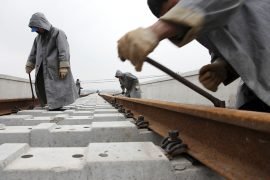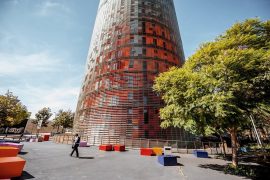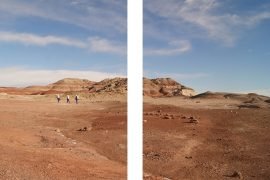[dropcap letter=”F”]
our years after Un altre jo, Guillamino publishes Fra Jupiter, a splendid album written and recorded for the most part during an artist’s stay at the Poblet Monastery. Pau Guillamet (Barcelona, 1976) sought peace and focus among the venerable walls of that place, where he also found inspiration sharing the liturgies of the Cistercian monks. The result can be savoured live -and in the company of the same child choir that participates in the disc- on February 1st at the Granollers Nau B1, and on the 3rd of the same month at the Auditori Barradas de l’Hospitalet de Llobregat, in this case within the programming of the XXIV Festival Barnasants.
Why do you decide to go to Poblet to do the songs?
I needed a creative stress, put myself in a situation. When you are at home you end up doing nothing, because at any moment you have to deal with this or that. Inspiration at home is complicated: exceptional events have to happen, and at home there is usually nothing exceptional, everything is routine. I knew that if I set a temporal and spatial boundary the thing would work, because it has worked many times doing so. I thought that Poblet was a good idea, since it is close and at the same time very far, in the sense that it is very different. Some friends had already told me it was a good place to work. I made a special request to make music. Although I thought they would say no, they did say yes, but I should work in the music hall of the Royal Tower, which actually is a fantastic, spectacular place. It is a room with a large gothic ogive, with a very beautiful reverberation, where there is practically nothing: a lectern, tapestry, one chair…
There was a whole liturgy every day between the time of singing with monks and having meals with them. I arrived there on a Sunday evening and went straight to the afternoon’s mass. I thought they would start to pray but they sang instead. A very beautiful modal song that immediately made me think very much about the auto-tune and trap… The guitars and the voices of the entire album were recorded there except the version of Sangtraït [Senyors de les pedres] and Cançó [adaptation of the homonymous poem by Màrius Torres]. Also. I imposed myself a technical limitation, which was that I worked directly with the small microphone that I used with my laptop.
What did you learn of living with the monks and being in a place like that?
Following their routines was part of the charm. I went to three religious services a day, out of the six or seven that they did, and I had a pretty tidy life. I woke up at seven and attended mass at eight. That’s almost an hour without breakfast. After breakfast I went to the music room, that did not have any heating: I had to work with the jacket on, and that was tough. At noon I went to another chapel where the sun hit, I took a pause and could go for a walk on the vineyard, but I had to start working again, because at three o’clock in the evening there was an evening mass. I had to take electricity from outside the room, with a cable extension, and every time I went away I had to disassemble everything: I could not leave the system plugged even when going for lunch! To these small privations one needs to get used, and they condition your perception and decisions. The difficulties led me to focus more. And attending the masses I found fabulous ideas. I have made my own lyrics, but on the recording there are also fragments from the Old Testament: in the songs Perdura eternament el teu amor and Càntic d’entrada… all this is literal, but afterwards I added my verses. Then there are songs that are of one hundred percent my own.
Are you a man of religious beliefs?
No, no. Liturgy and spirituality attract me, but I do not believe in God.
The sound of the album shows acoustic concerns, electronics and soul. How do you find this formula?
At the beginning, the album had to be only voice and guitar, recorded entirely there. A completely folkie album. But after staying at Poblet, I went to show the demos to friends, acquaintances, and some of them said: “But man, surely you will not put any rhythm? This is not quite folk, right? I see it a little soul…”. In the end I thought that in some songs I saw an organ, and when I started including the organ parts, the thing already caught a nicer colour. Afterwards I found out that I could insert a guitar, organ and that instrument from Trinidad and Tobago called steel drum but, in the end, I chose the drums and bass, which I recorded myself.

The disc also includes the Little Singers of the Coral Society Friends of the Union of Granollers. What is their contribution?
I wanted to confront the atmosphere folkie reverberated with these white voices. I was looking for a young age band to produce voices still not perfectly sculpted, showing a certain tremor. I found some children very well prepared and disciplined, with a memory and a brutal retentive, but that being ten years old they still had the sound that I was interested in, for evoking a certain state of innocence.
Before, you mentioned the version of Sangtraït and the adaptation of Màrius Torres. Why did you want to include them on the disk?
I was looking forward to a nostalgic version, as well as an adaptation, because I did not do any since eXile and Pere Quart ten years ago. As a youngster, I was a Sangtraït fan. As for Màrius Torres, I encountered a poetic anthology, and I liked it because it was the last poem he wrote. I read some and found a very nice story. Torres finished the song a few days before dying very young of tuberculosis, and by then he was studying harmony to compose music. I thought that perhaps he might have composed music for that song -his last song Cançó– and since he could not do, I would do it myself.
Fra Jupiter… why is he called Jupiter?
The euphony comes somehow from Poblet. There are all friars (“fray” o “frare” in Catalan) there: Friar Borja met me, there was also Friar Rafael, and others… the word “Fra” is beautiful. “Frare” (friar) sounds different, but “fra” can be like DJ Fra… sounds cool, it’s just as exotic: f-r-a, what language is it? I chose Jupiter basically to make it sound good.
Now it’s been fifteen years since you released your first album. When you look at the work done, how do you see yourself?
I look good, happily out of the industry. I have never done the same, each disc is different, and I play that card. Since I started working I have been involved with all kinds of projects, some of them commissions, and so time has passed thus. My coherence is to be very incoherent. There are people who develop careers with a formula and repeat it with small variations, but I do not. I do not pretend anything or have any strategy.




















